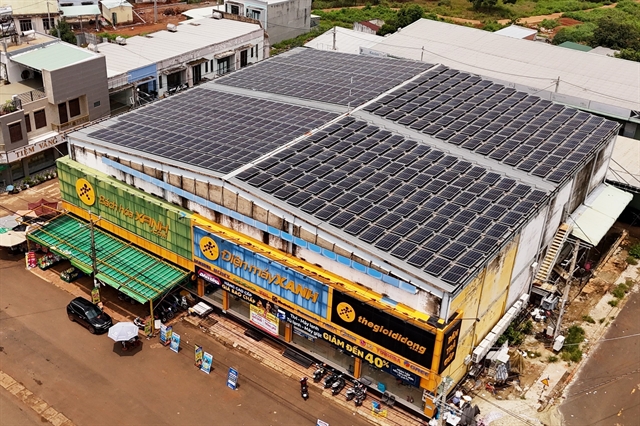Excess rooftop solar power can be sold to the national grid at no more than 20 per cent of the installed capacity, according to a new Government decree on encouraging self-produced and self-consumed rooftop solar power issued on Tuesday.

A rooftop solar power system in Bình Phước Province. Excess rooftop solar power can be sold to the national grid at no more than 20 per cent of the installed capacity. — VNA/VNS Photo Hong Dat
Excess rooftop solar power can be sold to the national grid at no more than 20 per cent of the installed capacity, according to a new Government decree on encouraging self-produced and self-consumed rooftop solar power issued on Tuesday.
The new regulation, Decree No. 135, applies to rooftop solar power installations on houses, offices, industrial parks, clusters, export processing zones, high-tech zones, economic zones and production and business establishments.
Excess electricity can be sold to the national grid, but sales are capped at a maximum of 20 per cent of the installed capacity.
Power from rooftop solar installations on public assets cannot be sold, however.
Vietnam Electricity must pay for the excess power sold to the national grid at a price equal to the average market price previously announced by the electricity operator.
Rooftop solar power projects with capacity of 1,000kWh must comply with procedures on electricity planning and apply for operational licences to be able to sell the excess to the national grid.
For systems below 100kWh, organisations and individuals are allowed to sell excess power without licences.
Meanwhile for systems with a capacity between 100kWh and 1,000kWh, Vietnam Electricity is in charge of implementing technical solutions to control the connection to the national grid to ensure safety.
There are about 103,000 rooftop solar power systems across the country, with a total installed capacity of more than 9,500MW.
Under the eighth national power development plan (PDP8), the total rooftop solar power capacity is expected to increase by 2,600MW, with at least 50 per cent of office buildings and residential homes expected to use self-produced and self-consumed rooftop solar power by 2030.
Previously, the Ministry of Industry and Trade has said that there was hesitation about buying excess rooftop solar power due to its instability and dependence on weather conditions.
To connect the excess into the national grid, huge investments in storage, transmission, operation and maintenance are required.
Thus, a cap for selling the excess at no more than 20 per cent of the installed capacity is needed.
Organisations and individuals are encouraged to install battery energy storage systems to ensure safe and stable operations.
For solar power projects that sell electricity to other organisations or individuals, the transaction will be conducted following a direct power purchase agreement. — VNS
Read original article here